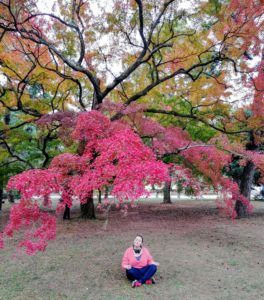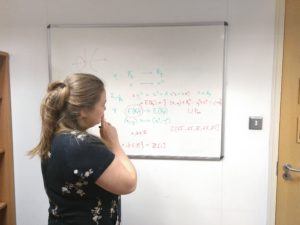Profile
Chloe Martindale
Curriculum Vitae
-
Education:
PhD in Number Theory from Leiden University (the Netherlands) and Bordeaux University (France); Bachelors and Masters in Mathematics from Oxford University; Year 9-13 at Chetham's School of Music; Year 4-8 at the Perse School for Girls in Cambridge; Reception-Year 3 at Newton Primary School in Eltisley.
-
Qualifications:
PhD in Number Theory (2018), First Class MMath (Masters degree, 2013), First Class BA (2012), 4 A levels (all As, 2009+2007), 1 AS level (A, 2008) 11 GCSEs (8 A*s, 3 As, between 2004 and 2007)
-
Work History:
Postdoc at Eindhoven University of Technology (in the Netherlands, 2017-2019), PhD Candidate (2013-2017), Part time student job at Oxford Philomusica (2009-2013), Internship at Schlumberger (Summer 2011), Office job at Kingspan Potton (Summers 2009 and 2010)
-
Current Job:
Lecturer in Crytopgraphy
-
Employer
University of Bristol
-
About Me
I'm a cryptographer and a musician, based in Bristol.
-
Read more
I’m a Lecturer of Cryptography at the University of Bristol. I only started in Bristol in November 2019, before that I lived in the Netherlands (and a little bit in France) for 6 years. I now live Bristol with my husband Erik and my cat Max. I LOVE singing and I sing in a local choir called Exultate, and I also love singing all kinds of other music styles including pop, musicals and opera. I also play the piano and I’ve just started learning the guitar. My pronouns are she/her.
-
How I Use Maths In My Job:
Most of the time in my job is spent doing research in cryptography: the maths (mostly algebra and geometry) that is used to encrypt your WhatsApp messages, emails, google searches, and basically anything you do on the internet or with your phone, so that you can keep it private. For example, if you want to use a secret code to encrypt a message, I’ll give you a code that should be complicated enough that it would take a hacker at least 100 years to try all the possibilities, so that the probability that they can read your message in less than 100 years is very low. I spend time split between two things: trying to break the encryption that’s being used, and trying to invent new ways to encrypt things that we think can’t be broken. We hope that, with enough people openly trying to break the encryption in use, as a community we find any weaknesses in the encryption before the ‘bad guys’.
I use most of the maths you are learning now every day: definitely Number, Fractions, Decimals & Percentages, Ratio & Proportion, Algebra, Geometry & Measurement, and Probability.
-
My Work
Lecturer in Cryptography
-
Read more
My main area of research is in a new area of cryptography called ‘post-quantum cryptography’. I explained above that all of your private data that you send in WhatsApp messages or store on the internet in any way is encrypted using maths. What I didn’t say is that there is a new type of computer being developed that uses quantum physics called a ‘quantum computer’. It looks like this:

(Image credit: IBM Research).
At the moment, these new types on computers are not very powerful, but they work in a completely different way to the computer you use at school or at home, and a small breakthrough could give a quantum computer that will be able to decrypt everything you’ve stored on the internet.
The research I do is developing new ways of encrypting your private data (still using maths!) that this new type of computer won’t be able to decrypt, so that it will still be safe. It is a new area with lots of unsolved questions, so we’re racing against the clock to get there before quantum computers are too powerful.
-
My Typical Day
Research
-
Read more
I spend most of time doing research. I do most of this together with other people, so that means that on a day-to-day basis I might talk to my co-authors on Skype or in person, or sometimes if we live in different countries I go and visit them for a week or they come and visit me for a week. I also spend a lot of time travelling around the world to talk about my work to other researchers and listening to others talk about their work, so that we can use each other’s ideas to develop new things. Here’s a picture of me on a day off in Japan last year when I was visiting to teach PhD students about my research:

Of course, that wasn’t an average day! On an average I’m in my office in Bristol making vain attempts at solving maths problems:

-
The CHRISTMAS LECTURE related to my work:
Lecture 3: How can we all win from 36:00
-
My Interview
-
What or who inspired you to follow your career?
My Year 2 primary school teacher Mrs Jones, my A Level teacher Dr Kimber, and my boss while I was a postdoc, Prof. Tanja Lange.
What's your favourite use for maths in everyday life?
The coolest is probably exploring outer space.
What did you think about Maths when you were in school?
It was my favourite subject.
What did you want to be after you left school?
A mathematician!
Were you ever in trouble at school?
All the time.
If you weren't doing this job, what would you choose instead?
An opera singer.
Who is your favourite singer or band?
Eivor, an amazing indie folk singer from the Faroe Islands.
What's your favourite food?
Cheese, but choosing which one is too hard!
What is the most fun thing you've done?
I can't choose only one thing! On the list are scuba diving in the Great Barrier Reef and canyoning in Mallorca...
Tell us a joke.
What do you call friends who love algebra? Alge-bros.
-
